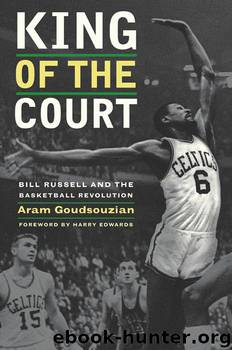King of the Court: Bill Russell and the Basketball Revolution by Aram Goudsouzian

Author:Aram Goudsouzian [Goudsouzian, Aram]
Language: eng
Format: azw3
ISBN: 9780520945760
Publisher: University of California Press
Published: 2010-05-01T04:00:00+00:00
During that same preseason, while in Puerto Rico, Russell called together Boston’s veterans. They represented a century of experience, he said. While establishing authority as coach, he had spread himself thin. Now, he would rely on them. “He was man enough to put away some of his stubbornness and pride after his first year, and then ask for help,” recalled Wayne Embry. Russell also invited criticism. He had a tendency to rest after grabbing a rebound and starting the fast break. But if prodded to hustle, he skipped to attention and pushed himself down the court.2
Russell carried 230 pounds, 15 more than usual. Age slowed him down. “I’m not the player I was five years ago,” he said. “I’m not quite as quick as I was, I don’t go out as far from the basket as I did, and I can’t do the little things I used to do.” He gave Embry more minutes. While averaging career lows for points and rebounds, he complained about feeling like a “300-year-old center.” Cortisone shots dulled his aching knees. He likened himself to a gunfighter: a generation had grown up watching, studying, and yearning to face the old sheriff. “They keep coming,” he said, “and sometimes I wonder if I still have to prove myself.”3
The Celtics mirrored Russell’s apparent decline. Russell, Sam Jones, Bailey How-ell, and Satch Sanders had moved another year past thirty. Their age showed especially on the second leg of back-to-back games, when they went only 17-16. They also lost four consecutive games for the first time since January 1962, when Russell had been injured. In February 1968 the Lakers thrashed them, 141-104, the worst home loss in Celtics history.4
Both in person and through the press, Red Auerbach tongue-lashed the Celtics for lacking aggressiveness, losing concentration, and pacing themselves. He blamed Russell. He chastised Russell, moreover, for missing a November 1967 game during a surprise blizzard. Howell walked along frozen train tracks, and John Havlicek trudged two miles across the Mystic River Bridge to reach Boston Garden on time. Russell hiked through snow and hitched a ride with a police car, but he arrived when the game ended. By then Auerbach had coached a victory over San Francisco. In the locker room, before rookies and veterans alike, the general manager upbraided the player-coach about his responsibilities.5
The 76ers further provoked Boston’s anxieties. One preseason assessment tabbed Philadelphia a budding “minidynasty,” and following recent tradition, their games featured physical clashes and play-off-style passion, with each team dominating its home contests. After trading first place back and forth through the season’s early months, the 76ers opened a lead. When Philadelphia finally won at Boston Garden on March 3, it essentially locked Boston in second place, which some fans commemorated by dumping garbage on the parquet floor.6
The Celtics finished 54-28, their lowest winning percentage since Russell’s rookie year. Philadelphia had eclipsed Boston, and Wilt Chamberlain had transcended Russell. Boston’s aging warrior still garnered respect: his teammates believed in him, reporters admired him, and referees cut him slack.
Download
This site does not store any files on its server. We only index and link to content provided by other sites. Please contact the content providers to delete copyright contents if any and email us, we'll remove relevant links or contents immediately.
Imperfect by Sanjay Manjrekar(5856)
Wiseguy by Nicholas Pileggi(5754)
The Body: A Guide for Occupants by Bill Bryson(5066)
Tuesdays with Morrie by Mitch Albom(4754)
Unstoppable by Maria Sharapova(3515)
Not a Diet Book by James Smith(3397)
Crazy Is My Superpower by A.J. Mendez Brooks(3380)
Into Thin Air by Jon Krakauer(3370)
The Mamba Mentality by Kobe Bryant(3251)
The Fight by Norman Mailer(2918)
Finding Gobi by Dion Leonard(2825)
Tuesdays With Morrie by Mitch Albom(2742)
The Ogre by Doug Scott(2671)
My Turn by Johan Cruyff(2615)
Unstoppable: My Life So Far by Maria Sharapova(2492)
Accepted by Pat Patterson(2359)
Everest the Cruel Way by Joe Tasker(2326)
Borders by unknow(2298)
Open Book by Jessica Simpson(2257)
